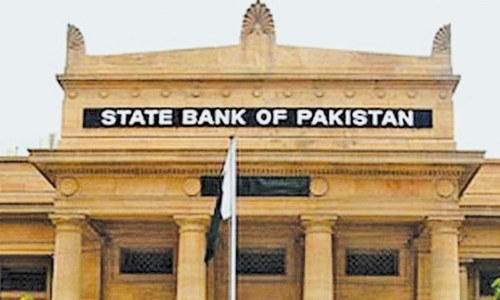State Bank of Pakistan (SBP) on Friday decided to raise its policy (target) rate by 150 basis points (bps) to 10 per cent, effective from December 3.
The decision was taken in light of the current and evolving macroeconomic situation in the country and the Monetary Policy Committee observed that further consolidation was required to ensure macroeconomic stability, an SBP statement said.
The economic data released since the last Monetary Policy Committee meeting in September shows that the positive impact of recent stabilisation measures has started to materialise gradually. Particularly, the current account deficit is showing early signs of improvement.
However, the near-term challenges to Pakistan's economy continue to persist with rising inflation, an elevated fiscal deficit, and low foreign exchange reserves. These concerns are also captured in the results of recent consumer and business confidence surveys.
Average headline CPI inflation during the first four months of FY19 has increased to 5.9 per cent as compared to 3.5 per cent in the corresponding period of FY18.
This trend is even more pronounced for core inflation, which indicates growing inflationary pressures in the economy. A disaggregated analysis reveals that this is due to both, demand and supply-side factors.
Considering these developments, SBP projects average headline CPI inflation for FY19 in the forecast range of 6.5-7.5 per cent, above the annual target of 6 per cent.
Although the recent decline in international oil prices could potentially play a positive role in slowing down the current inflation trajectory, the risks currently remain tilted towards the downside.
Taking a lead from the recent large-scale manufacturing data, economic activity is expected to witness a notable moderation during FY19 reflecting a short-term cost of pursuing macroeconomic stability.
The lagged impact of the 275 basis point increase in the policy rate since January 2018 and other policy measures is likely to contain domestic demand during the current fiscal year.
Furthermore, initial estimates for major crops, except wheat, are expected to fall short of levels achieved in the last year. The slowdown in commodity producing sectors is expected to limit the expansion in the services sector as well.
In this backdrop, SBP projects real GDP growth for FY19 at slightly above 4 per cent.
On the external front, import growth decelerated to 5.8 per cent during Jul-Oct FY19 from 26.3 per cent recorded in the same period last year reflecting the impact of recent tightening measures.
Even this growth in imports is mainly explained by an increase in the oil import bill because of higher international oil prices. Non-oil imports contracted by 4 per cent in the first four months of FY19.
This, along with a continued increase in exports and workers remittances, narrowed the external current account deficit from US$5.1 billion in Jul-Oct FY18 to US$4.8 billion in Jul-Oct FY19; a net improvement of 4.6 per cent.
Despite these positive developments, SBPs net liquid foreign exchange reserves remained under pressure falling to US$8.1 billion as of November 23, 2018 from US$9.8 billion at the end of FY18.
Going forward, there is an expectation of receiving higher foreign inflows from both private and official sources during the second half of FY19. Furthermore, recent bilateral arrangements including the deferred oil payments facility would also be available to the market from January 2019 onwards.
The projected decrease in the current account deficit, that could be further supported by the recent decline in international oil prices will instill confidence in the foreign exchange market. These developments would help reduce pressures on SBPs net liquid foreign exchange reserves.
In the first four-and-a-half months of FY19, statistics show that almost all liquidity in the banking system is generated through an increase in the Net Domestic Assets (NDA) as the Net Foreign Assets (NFA) continued to contract. Besides the increase in budgetary borrowings from SBP, relatively higher credit flows to the private sector have been the major contributors to an increase in NDA.
Despite contractionary monetary conditions, an increase in working capital needs due to capacity additions in the last three years and recent substantial increases in input prices, are the main reasons behind relatively higher credit flows to the private sector.
After considering all of these developments, the Monetary Policy Committee noted that continued inflationary pressure (and rising inflationary expectations) needs to be checked; real interest rates remain low; although narrowing, the current account deficit is still high and the fiscal deficit remains elevated; and unfolding global developments, particularly the gradual but consistent normalisation of monetary policy in the developed economies demands proactive domestic monetary management.













































